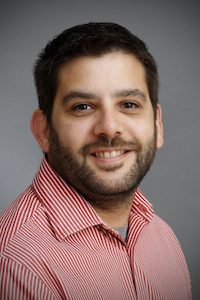Professor shines light on 'shadow lobbying'
News
Dr. Timothy LaPira, associate professor of political science at James Madison University, will be a featured panelist in Washington, D.C., for an upcoming discussion on the changing role of money in politics and the difficulty in tracking political influence.
The Sept. 16 event is sponsored by the Sunlight Foundation, a nonprofit organization aimed at increasing transparency and accountability in government, in collaboration with ReThink Media and OpenGov Hub.
LaPira, who has been teaching at JMU since 2010, has also worked as a legislative assistant to a member of Congress and as a researcher for the Center for Responsive Politics, where he was responsible for creating the Lobbying and Revolving Door databases on OpenSecrets.org.
In recent years, LaPira has gained national recognition for his research on “shadow lobbying” in response to stricter federal regulation of the industry.
In the public’s eyes, lobbying has always been somewhat of a shadowy profession, LaPira says. “These people are unknown, they’re unelected and they make a lot of money. So people don’t trust them, in part because the perception is that they influence public policy by making elected officials do something they wouldn’t otherwise do.”
The reality, LaPira says, is often more benign. “About 99 percent of a lobbyist’s job is simply paying attention to what’s happening on Capitol Hill as it relates to their clients.” These individuals are an important source of information, expertise and political intelligence, he says, and corporations and organizations of all sizes and stripes are willing to pay a premium for their services.
Although lobbying has held a place in politics, at least informally, since ancient times, the profession exploded inside the Beltway beginning in the 1970s as trade associations representing a broad swath of industry gave way to smaller, more specialized firms. “We used to only see associations of doctors and hospitals. Suddenly you had individual hospitals opening up an office on K Street,” LaPira says.
Government regulation of the lobbying industry began in earnest with the Lobbying Disclosure Act of 1995. In 2007, President George W. Bush signed into law the Honest Leadership and Open Government Act, which amended the LDA by strengthening public disclosure requirements concerning lobbying activity and funding, placing more restrictions on gifts for members of Congress and their staff, and providing for mandatory disclosure of earmarks in expenditure bills. The following year, Barack Obama made reducing lobbyists’ influence on Capitol Hill part of his presidential campaign platform.
“Before [the 2007 act], if you were a lobbyist, you might as well register and report any activity on behalf of your paying clients. That was really the only requirement,” LaPira said. “Now registering as a lobbyist subjects you to full disclosure requirements, including personal contributions to elected officials, as well as increased scrutiny and risk.”
To get around this, individuals have begun taking advantage of the so-called “20 percent loophole.” HLOGA stipulates that an individual must register as a lobbyist if more than 20 percent of his or her workload in a given week is spent on a single client. “That’s pretty easy to prove otherwise,” LaPira says.
The result has been a revolving door of special interests and high-profile individuals, including former congressmen like Tom Daschle and Eric Cantor, who are highly sought for their institutional knowledge and expertise but don’t have to register as lobbyists. In effect, the profession has been relegated to the shadows.
To shed some light on how many lobbyists there actually are in Washington, LaPira and a colleague drew a random sample of people listed in Lobbyists.info, then had JMU student assistants consult a variety of online sources to determine where they used to work and what jobs they have now. The researchers found that about half of those involved in policy advocacy did not report lobbying activities in 2012.
“We can’t, and ought not, ban lobbying,” LaPira concludes. “As political speech, it’s protected by the First Amendment. So the question becomes, how do we regulate it? Our only option is not to limit it, but to require transparency and full disclosure — good information about what these people are up to so that citizens, journalists, academics and politicians can know what’s going on.”
LaPira is currently under contract with University Press of Kansas for a book he is co-authoring with Herschel F. Thomas III, a doctoral candidate at the University of Texas. The book, titled “Revolving Door Lobbying: Public Service, Private Influence, and the Unequal Representation of Interests,” is expected to be published in the spring of 2016.
###
Sept. 12, 2014

